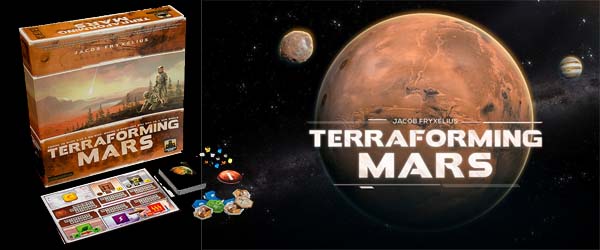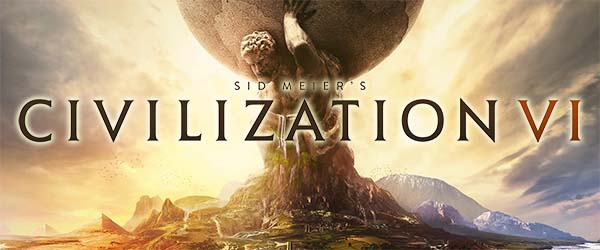
Steam recently released a digital version of the board game Terraforming Mars. I haven't played the digital version (which is getting "mixed" and negative reviews at the time of this writing), but I have played the board game version. It's pretty fun, and in celebration of the latest NASA probe landing on the surface of Mars, I thought I'd launch a review of the board game.
Terraforming Mars has a wide variety of gameplay mechanics, which makes it kind of difficult to clearly categorize it. It also makes it a little difficult to teach the game to new players efficiently. It's not an overly-complicated game, however. It's just a lot of different concepts that you have to explain. Regardless, I've been able to get through learning games with new players in about three or three-and-a-half hours (including the rules explanation). So it's not overly burdensome to learn and play. It's also not terribly hard to simply play a sample round to teach the game flow, and then mulligan the game if any players feel they dug themselves into a hole.
Terraforming Mars has multiple distinct mechanics, ranging from tableau-building to tile-placement.
There's tile placement with adjacency bonuses. There's resource management. There's action economy. There's a little bit of tableau building and hand management. There's even a certain degree of bluffing. Playing with the non-basic corporations adds variable player powers, You can even optionally play with card drafting! Pretty much the only thing that we're not doing is loyalty / betrayal mechanics. Despite including so many varying game mechanics, nothing feels out of place, and everything fits together well.
The rulebook includes footnotes explaining the scientific basis for the rules and mechanics.
Depending on how you play, however, the actual game board and your tableau of cards can sometimes feel very disparate. If you're not actively placing tiles on the board, then the whole board can pretty much boil down to a score and prerequisite tracker. However, if you're avoiding placing tiles on the board, then you're probably going to lose, as I've yet to see a predominantly card-based strategy win the game.
The board itself includes a map of Mars' surface, and has notable landmarks on Mars clearly labeled. Unfortunately, the board only covers one half of Mars' surface, so there's some notable landmarks that are not included at all (perhaps the other side of the planet is an expansion?). The resource cubes are very shiny and pretty, and have an appropriately sci-fi aesthetic to them. The rulebook also includes little footnotes that explain some of the scientific bases for the game's rules and mechanics. it's like the kind of thing you might expect if Neil DeGrasse Tyson wrote a board game. Science and space nerds will probably really appreciate these efforts at scientific accuracy.
The resource cubes are pretty, but shift around very easily on the flimsy, card stock economy boards.
Other components besides the resource cubes are kind of cheap and flimsy though. The player economy boards are printed out on basic card stock. There aren't any slots or grooves for the production cubes to sit in, so they slide around very easily if the table is jostled, or if the economy board is shifted around. You may want to invest in some third-party replacements or overlays in order to solve this problem.
The box also doesn't have any inserts of any kind for storing components -- just a handful of plastic, zip-lock bags. They expect you to just drop all the cards in a plastic baggie and just toss them in the box haphazardly along with all the other pieces!
At a price point of $70 (USD), I expect more from a game's components! Fortunately, where the game lacks in production value, it more than makes up for in entertainment value!
... [More]
ef527080-aedf-4583-a72d-8d6ee9108d4f|0|.0
Tags:Terraforming Mars, Stronghold Games, Jacob Fryxelius, board game, Mars, space, science fiction, terraforming, technology, hex, tile, city, forest, ocean, temperature, oxygen, victory points

I made it through the big winter game releases, my play-time with Civilization VI's first expansion has slowed down, and the lackluster Green Cities expansion means that I'm not sinking tons of time into Cities: Skylines anymore. This has left me free to finally dive into my Steam back-log once again and try to finally cross off some of the games that have been sitting there for a year or longer. Oh, sure, I have some big games that I'm still playing off and on, like Monster Hunter: World and the 2.0 update of Stellaris, and those reviews will come in time.
Firewatch was released in February 2016, and has been sitting in my Steam library since the summer sale of that same year. I was actually surprised that it had only been two years. I was half afraid that I'd find the game had been sitting around since like 2012 or something like that. Two years isn't that bad, right? I'm not too late to this party, am I?
Firewatch is a summer job to just ... get away from it all.
The life you left behind
Basically, the game is about a middle-aged man dealing with a mid-life crisis. Except that it isn't the stereotypical "mid-life crisis" in which a 40-year-old man goes out and buys a sports car to feel young and "cool" again. In this case, Henry takes a job as a fire look-out at a national park in order to escape the very real life crisis of dealing with his wife suffering from early-onset Alzheimers. He's trying to escape from the very real trauma of losing his wife, Julia. Julia is actually still alive, but the illness means that she isn't the same person, and Henry is struggling with whether he can even stand to visit her anymore, and whether she's effectively "dead to him".
Not only is he losing his wife, but he's also dealing with the guilt and grief of not ever having really given her the life that she wanted. His own selfish desires and apathy meant that they kept putting off having kids, Julia never got to live where she wanted to live and have the job that she wanted to have, and so forth. And now Henry and Julia are suddenly out of time. Not only can he not have the life with Julia that they both want, but he's not young enough to really start over either. He's stuck with the life choices that he's made, and he doesn't want to have to face that.
The game that follows is an exploration of choice, and how a person copes with the consequences of their choices.
There won't always be a "later"...
I'm in my early 30's (a good decade younger than Henry), but I'm starting to get to the age when this sort of thing really hits me hard as well. I'm not 20 years old anymore. I'm becoming very much aware of the ticking clock as well. The pressure to have children soon or accept that we never will weighs on my girlfriend an I. Fortunately, she has a child from a previous relationship, so we did both have the opportunity to raise at least one child together.
My 7-year-old proxy daughter, by the way, asked me who my character in the game is and what he looks like. I told her that he's a "kind of pudgy, balding, middle-aged man with a beard, named Henry." To which she responded, "like you?". Sigh. Yes, sweetie, just like me... [More]
8fc0bb9b-149c-4a34-a9b6-20225c65b05f|0|.0
Tags:Firewatch, Steam, Campo Santa, Panic Inc., walking simulator, indie gaming, mid-life crisis, marriage, time, Alzheimers, dementia, open world, map, compass, cartography, national park, fire, forest, forest fire, nature, road trip, camping

Civilization VI may look very similar to Civilization V at a glance, but once you start playing it, you're going to notice a lot of subtle differences. One of the most immediate differences will be the changes to unit-movement rules with respect to terrain. Units still travel on hexes, and terrain such as hills and forests still slow down movement, just as in the previous game. But this time around, the cost to enter a tile must be paid before entering that tile! This is a small, but significant change of rules that may force you to change the way that you explore the map.
The rewards of exploration are many, and finding these rewards is key to a good start.
Efficient exploration is key to getting off to a good start in Civilization. And a good start is key to success at higher difficulties and in competitive multiplayer. This is still true in Civilization VI. First and foremost, exploration will reveal valuable real estate for settling your first few cities, including resources, coast lines, and natural wonders. An efficient explorer will also be likely to uncover more tribal villages (i.e. "goody huts"), which will grant tech boosts, extra money, free units, or a head start towards founding your own pantheon. Efficient exploring will also introduce you to more city states, and you'll be more likely to be the first player to meet the city state. Being first to meet a city state will grant you a free envoy. This will grant you an immediate bonus depending on the type of city state, and it will put you one step closer to unlocking additional bonuses and becoming the suzerain of that city state.
So now that we've seen the rewards and benefits that await our exploration of the map, let's take a look at those new movement rules and how they'll impact our early exploration... [More]
34003f4c-d37b-4dae-b69d-b6175f32dc49|1|5.0
Tags:Sid Meier's Civilization, Civilization VI, unit, movement, hex, exploration, hill, forest, jungle, river, terrain, scout, warrior, city, city state, suzerain, natural wonder, ancient ruin, eureka, barbarian, encampment, pillage

There's one civilization that I have not yet covered in my Brave New World strategies series that did receive an explicit rewrite of its unique national ability. I haven't covered them yet because that rewrite isn't so much a change to their ability, as it is really just a clarification that the ability applies to the new rules. The Iroquois civilization led by Chief Hiawatha has an ability that explicitly utilizes the expansion's trade route mechanics. The Iroquois are another civilization (like India) that receives a lot of hate from the Civ V gaming community due to some supposedly lackluster, highly-situational uniques. This strategy will focus on utilizing those uniques when they are beneficial, and on compensating for their downfalls and limitations.
Very little is known about the early history of Iroquoian people prior to the arrival of Europeans in the Americas. The Native American tribes had no written language, and their histories were passed down through oral tradition. According to that tradition, a great Peacemaker united the eastern Great Lakes tribes of the Mohawk, Oneida, Onandaga, Cayauga, and Seneca sometime between the 12th and 15th centuries. Other tribes would later join the confederacy, including some that were displaced from their native lands by European settlers. Iroquois culture was matrilineal, meaning that children were born into the mother's family, and women had a great deal of influence in the politics of the tribes. The Iroquois Confederacy utilized a representative system in which each tribe appointed a number of chiefs (based on relative population of the respective tribes) to serve on a council. There was both a council of male chiefs, and also a council of clan mothers that both had roughly equal authority.

Hiawatha is a near-mythical figure in Iroquois history. He was a follower of the Great Peacemaker, who traveled between the various tribes of the region preaching a prophecy of a strong alliance uniting all the tribes of the Great Lakes region in peace. Hiawatha, along with the Peacemaker, effectively founded the Iroquois Confederacy using his skills as an orator (and, in some traditions, magic) to convince the various tribes to join. According to oral tradition, the Seneca resisted the alliance, leading to a confrontation that was stopped when the sun miraculously went dark, turning day into night. This supposed solar eclipse lead the Seneca to put down their arms and commit themselves to the alliance. [More]
070ae582-fddf-40f1-8379-9204a2c72f78|1|5.0
Tags:Sid Meier's Civilization, Civilization V: Brave New World, Civilization V: Gods & Kings, Civilization V, Iroquois, Hiawatha, Mohawk Warrior, Longhouse, Great Warpath, forest, jungle, food, deer, city connection, production, workshop, swordsman, Mohawk, Oneida, Onandaga, Cayauga, Seneca, Civ-V
|

| 12 | | | | | | | 60 | | 11 | | | | | | | 55 | | 10 | | | | | | | 50 | | 09 | | | | | | | 45 | | 08 | | | | | | | 40 | | 07 | | | | | | | 35 | | 06 | | | | | | | 30 | | 05 | | | | | | | 25 | | 04 | | | | | | | 20 | | 03 | | | | | | | 15 | | 02 | | | | | | | 10 | | 01 | | | | | | | 05 |
|